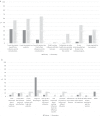Knowledge, attitudes, behaviours, and beliefs of healthcare provider students regarding mandatory influenza vaccination
- PMID: 30395762
- PMCID: PMC6605728
- DOI: 10.1080/21645515.2018.1543523
Knowledge, attitudes, behaviours, and beliefs of healthcare provider students regarding mandatory influenza vaccination
Abstract
Influenza infection poses the same risk to healthcare students as to practising clinicians. While there is substantial dialog about the benefits, risks, and ethics of mandatory influenza immunization policies in Canada, there has been little engagement of healthcare students. To explore the knowledge, attitudes, beliefs, and behaviours of healthcare students, we administered a web-based survey to students at Dalhousie University. Influenza vaccination status varied by program type, with 86.3% of medical students (n = 124) and 52.4% of nursing students (n = 96) self-reporting receipt of the influenza vaccine both in the previous and current seasons; pharmacy students' coverage fell between the two. Pharmacy students had higher mean knowledge scores (10.0 out of 13 questions) than medical (9.26) and nursing (8.88) students. Between 56.1% and 64.5% of students across disciplines were in support of a mandatory masking or vaccination policy, and between 72.6% and 82.3% of students would comply if such a policy were in place. A sense of duty to be immunized, desire to be taught more about influenza and influenza vaccine, belief that the hospital has a right to know vaccination status, support for declination policy, and willingness to accept consequences of noncompliance were all predictors of student support of mandatory policies. Medical and pharmacy students tended to hold more pro-influenza vaccination attitudes, had higher knowledge scores, and better vaccine coverage than nursing students. Based on the overall vaccination behaviour, knowledge, beliefs, and attitudes of students surveyed, this study demonstrates that mandatory influenza immunization policies are generally supported by the next generation of practitioners.
Keywords: Influenza vaccines; health personnel; mandatory vaccination; students.
Figures
Similar articles
-
The role of healthcare provider attitudes in increasing willingness to accept seasonal influenza vaccine policy changes.Vaccine. 2016 Nov 11;34(47):5704-5707. doi: 10.1016/j.vaccine.2016.08.083. Epub 2016 Sep 21. Vaccine. 2016. PMID: 27665353
-
Mandatory policies for influenza vaccination: Views of managers and healthcare workers in England.Vaccine. 2019 Jan 3;37(1):69-75. doi: 10.1016/j.vaccine.2018.11.033. Epub 2018 Nov 22. Vaccine. 2019. PMID: 30470641
-
Perception of mandatory infant vaccines and trust in vaccination among first-year healthcare students: An opportunity window for the training of future healthcare workers.Vaccine. 2020 Jan 22;38(4):794-799. doi: 10.1016/j.vaccine.2019.10.099. Epub 2019 Nov 7. Vaccine. 2020. PMID: 31708179
-
Influenza vaccination of healthcare workers: a literature review of attitudes and beliefs.Infection. 2006 Jun;34(3):142-7. doi: 10.1007/s15010-006-5109-5. Infection. 2006. PMID: 16804657 Review.
-
Mandatory influenza vaccination for all healthcare personnel: a review on justification, implementation and effectiveness.Curr Opin Pediatr. 2017 Oct;29(5):606-615. doi: 10.1097/MOP.0000000000000527. Curr Opin Pediatr. 2017. PMID: 28700416 Review.
Cited by
-
Do Degree Programs Affect Health Profession Students' Attitudes and Opinions Toward Vaccinations? An Italian Multicenter Study.Saf Health Work. 2022 Mar;13(1):59-65. doi: 10.1016/j.shaw.2021.10.005. Epub 2021 Oct 26. Saf Health Work. 2022. PMID: 35936207 Free PMC article.
-
Factors influencing nursing students' intention to accept COVID-19 vaccination: A pooled analysis of seven European countries.Nurse Educ Today. 2021 Sep;104:105010. doi: 10.1016/j.nedt.2021.105010. Epub 2021 Jun 10. Nurse Educ Today. 2021. PMID: 34126322 Free PMC article.
-
Influenza Vaccination of Romanian Medical Students during COVID-19 Times: From Knowledge to Behavior.Vaccines (Basel). 2024 May 30;12(6):594. doi: 10.3390/vaccines12060594. Vaccines (Basel). 2024. PMID: 38932323 Free PMC article.
-
Barriers Associated with the Uptake Ratio of Seasonal Flu Vaccine and Ways to Improve Influenza Vaccination Coverage among Young Health Care Workers in Poland.Vaccines (Basel). 2021 May 20;9(5):530. doi: 10.3390/vaccines9050530. Vaccines (Basel). 2021. PMID: 34065371 Free PMC article.
-
Vaccine Coverage against Influenza and SARS-CoV-2 in Health Sciences Students during COVID-19 Pandemic in Spain.Vaccines (Basel). 2022 Jan 21;10(2):159. doi: 10.3390/vaccines10020159. Vaccines (Basel). 2022. PMID: 35214618 Free PMC article.
References
-
- Kwong JC, Ratnasingham S, Campitelli MA, Daneman N, Deeks SL, Manuel DG, Allen VG, Bayoumi AM, Fazil A, Fisman DN, et al. The impact of infection on population health: results of the ontario burden of infectious diseases study. PLoS ONE. 2012;7(9):e44103. doi:10.1371/journal.pone.0044103. - DOI - PMC - PubMed
-
- Public Health Agency of Canada For health professionals: flu (influenza); 2017. accessed 2018 April 20 https://www.canada.ca/en/public-health/services/diseases/flu-influenza/h....
-
- Statistics Canada 2014. Health Trends. Statistics Canada Catalogue No. 82-213-XWE. Ottawa: Released 2014 June 12 accessed 2018 May 17 http://www12.statcan.gc.ca/health-sante/82-213/index.cfm?Lang=ENG.
-
- Malavaud S, Malavaud B, Sandres K, Durand D, Marty N, Icart J, Rostaing L. Nosocomial outbreak of influenza virus A (H3N2) infection in a solid organ transplant department. Transplantation. 2001;72:535–537. - PubMed
MeSH terms
LinkOut - more resources
Full Text Sources
Medical

